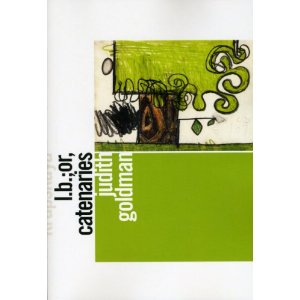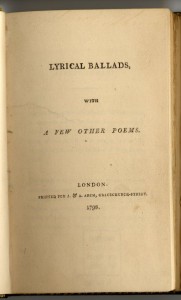IT'S NOT CONCEPTUAL IT'S CONSENSUAL
BY Julie Carr
I figured if I put "conceptual" in the title of my post, I'd get more readers. Did it work? I'll never know. But the topic of this blog post is "consensual" poetics, not conceptual—whether or not conceptual poetry is dead, dying, moving into middle age, or still in its young adulthood. As I told Rachel Zucker recently, I don't believe in "types of poetry," I don't really even believe in poetry. I believe in writing, and shun all categories and labels. However, I will now try to define Consensual Poetry, "a movement which I recently founded and which nobody knows about." I will use as my example a new book by Judith Goldman titled l.b.; or, catenaries, published by Krupskaya last year.

This book is one of the most compelling, moving, and smart books I've recently read, and because I love it, I want to write about it. But this will not be a review. Rather, a manifesto.
Consensual Poetry makes a pact with the reader, a pact that, unlike that of "conceptual poetry" (in some of its purist manifestations), includes the idea that the reader will actually read the work. As in consensual sex, both parties, reader and writer, must be willing to show up. And both must show up with respect. The writer respects the reader by writing something that is engaging, challenging, and exciting. The reader respects the writer by being willing to be challenged, disoriented and surprised, and by bringing her full intelligence and curiosity to the task of reading.
Consensual Poetry is a poetry that is written "with" the senses. No matter how grand or smart the idea behind the work may be, this work is still involved with the ear and eye, with rhythm as a bodily sport, with the body in general as topic and source for writing. Take the following from l.b.: "My penis subpoenaed / Pen's penalty."
Consensual Poetry is "con sense" in another way as well. It's interested in making sense. The work will press against conventional notions of sense, but it will not simply place the cat in outer space because it can. Rather, the work will be interested in "saying" as much as in "playing." Again, from l.b.: "But a hot afternoon sends word / We are post-ice hospice."
Consensual Poetry is in accord not only with the reader, but with its sources as well. That is, it uses sources not in order to make fun of them or disdain them, but in order to reveal their interest, their truths, or to see them in a new way. l.b.’s primary source is Lyrical Ballads. Goldman takes Wordsworth and Coleridge's text not as target, but as challenge.
Wordsworth's "advertisement" to his L.B. serves as epigraph to Goldman's book. "It is the honourable characteristic of Poetry that its materials are to be found in every subject which can interest the human mind," writes Wordsworth. "It is desirable that...readers, for their own sakes, should not suffer the solitary word Poetry, a word of very disputed meaning, to stand in the way of their gratification; but that, while they are perusing this book, they should ask themselves if it contains a natural delineation of human passions, human characters, and human incidents," he goes on. And thus we know how to read L.B. and l.b. both.
Both texts, despite the ocean of time and place that divides them, share a revolutionary spirit, one that begins from what I want to call a curious, compassionate, and affective humanism. Such a spirit necessarily draws their authors to experimentation and toward an expansion of the genre.

Consensual Poetry, like consensual sex, evokes (to quote O'Hara once more) "overtones of love." Beginning with the desires, needs, and curiosities of the human body and mind, the consensual poem invites the reader into an engaged participation, one that presupposes respect for reader and writer alike. Consensual Poetry respects the traditions from which it emerges and which it strives to invent. The "overtones of love" expand not only outward toward the text's reader, but also backward toward the text's forbears. In the case of l.b., such overtones reach also into the blighted and battered American community that the book seeks to address.
Julie Carr is the author of ten books of poetry and prose, including Real Life: An Installation (Omindawn...
Read Full Biography

